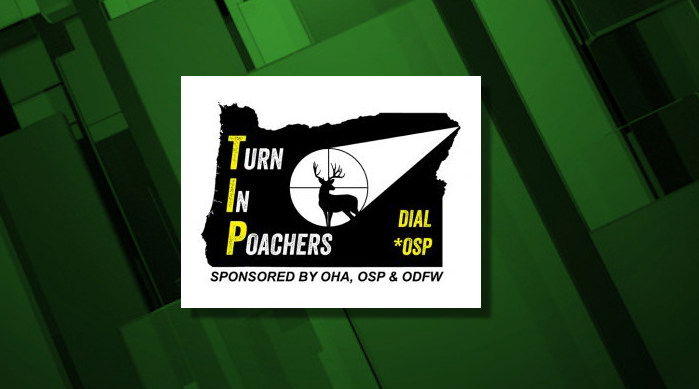ODFW voices alarm about recent ‘frenzy’ of wildlife poaching in Lane County

SALEM, Ore. (KTVZ) — A decapitated black bear joins a growing list of animals from a frenzy of poaching in Lane County in recent weeks, the Oregon Department of Fish and Wildlife reported Friday.
The crimes appear to be random and opportunistic, and officials are looking for leads in multiple cases.
Oregon State Police Senior Trooper Josh Wolcott, who works with the state’s only conservation K9, a yellow lab named Buck, is traveling Lane County investigating wildlife crime scenes and searching for evidence.
“This is the worst I’ve ever seen. Things are happening all over Lane County right now,” Wolcott said last week. “Every day is a new report.”
Reports include the bear and multiple deer and elk so far. Wolcott takes Buck to poaching sites where the dog detects shell casings, gunpowder residue and human scent; all of which can lead to a forensic bonanza. Tangible evidence helps, but even better would be a suspect’s name or a vehicle description.
When Wolcott discovered the black bear, he found a scene of carnage. The bear’s head, claws, backstrap and some leg meat were removed. The majority of the carcass was left to waste.
Poachers target black bears for their paws, claws, head and gall bladder. The gall bladder is an ingredient in some traditional medicine even though a synthetic version of bear bile is readily available.
Wolcott said it is very possible the gall bladder had been harvested, but because of the condition of the carcass, he was unable to tell for sure.
OSPF&W troopers need public information in the following cases:
- A black bear discovered on Roseburg Forest Products property outside of Veneta. The bear was likely poached about Oct 13. The head, claws, portions of backstrap meat and portions of leg meat were removed. The remainder of the bear was left to waste. Wolcott and K9 Buck located the carcass on Oct 15, in response to a call to the Turn In Poachers (TIP) Line.
- A doe deer discovered on National Forest Property near Fall Creek. The deer was likely poached on or about Oct 14. No meat was taken; the doe was left to waste. Wolcott and K9 Buck located the carcass on the morning of October 15 in response to a call to the Turn In Poachers (TIP) Line.
- A doe deer discovered along US Forest Service Road 2118 near Hills Creek Reservoir. The deer was likely poached on Oct 14 or 15. No meat was taken; the doe was left to waste. OSPF&W Senior Trooper Marshall Maher located the carcass on the evening of Oct 15, in response to a call to the TIP Line.
- A buck deer discovered on private property near Lowell. The deer was likely poached during the night of Oct 15 or early morning hours of Oct 16. No meat was taken; the buck was left to waste. Sr. Trooper Maher located the carcass on the evening of Oct 16 in response to a call to the TIP Line.
- A spike buck deer discovered near High Pass Road. The buck was likely poached on or about Oct 16. The buck was field-dressed and left to waste. Wolcott and K9 Buck located the deer on Oct 17, in response to a call to the TIP Line.
- A doe discovered in the Veneta area. It was likely poached on or about Oct 18.
ODFW Wildlife Division Administrator Doug Cottam is disappointed in this situation.
“There are available and inexpensive opportunities to legally harvest a deer or bear to eat in Oregon. There is no excuse for poaching,” he said. “I am very concerned about people who kill wild animals just to satisfy their desire to kill something.
Stop Poaching campaign coordinator Yvonne Shaw agrees. “Poaching is someone’s instant gratification that creates an ongoing loss of natural resources for the rest of us in Oregon,” she said.
The Stop Poaching Campaign educates the public on how to recognize and report poaching. This campaign is a collaboration among hunters, conservationists, land owners and recreationists. Our goal is to increase reporting of wildlife crimes through the TIP Line, increase detection by increasing the number of OSP Fish and Wildlife Troopers and increase prosecution. This campaign helps to protect and enhance Oregon’s fish and wildlife and their habitat for the enjoyment of present and future generations. Contact campaign coordinator Yvonne Shaw for more information. Yvonne.l.Shaw@state.or.us.